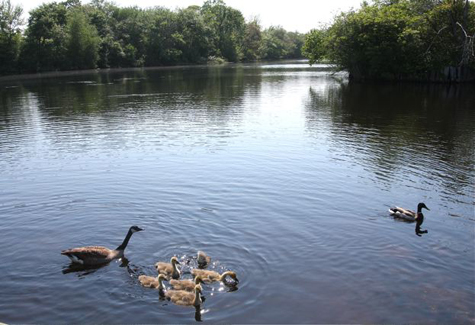Town may lobby state to revitalize riverfront parcels

Riverhead Town officials may take another stab at trying to get the state to ease restrictions on a law that severely limits development along the banks of the Peconic River.
“Right now, there’s no incentive to revitalize,” said Charles Voorhis of the engineering firm, Nelson, Pope and Voorhis, which was hired by the town to complete a $610,000 Brownfield Opportunities Area grant study of West Main Street and downtown Riverhead.
At issue is the state’s Wild, Scenic and Recreational Rivers Act, enacted in 1987, which came up at Thursday’s Town Board work session during a discussion of the grant. Most of the land being studied by the firm is subject to the state legislation.
Mr. Voorhis suggested the town make an application with the state to amend the WSRRA borders to make the parcels less restrictive, by reclassifying 216 acres along the river from “recreational” to “community” designation, under the legislation.
The community designation is not as restrictive as the recreational designation, although it is still restrictive, Mr. Voorhis said.
Non-river-related commercial and industrial uses, as well as government and institutional uses, are allowed under the community designation, but prohibited under the recreational designation, according to the state.
The bulk of the area along the Peconic from Mill Road west to Calverton is zoned “recreational” under the Rivers Act designation. The category limits new one- and two-family residential development to two-acre minimum lot sizes, requires new lots to have 200 feet of shoreline, and limits commercial development to river-related uses that are less than 10,000 square feet, or industrial uses that are limited to light manufacturing or warehousing.
Officials say that in trying to protect the river from overdevelopment, the Rivers Act also prevents property owners from redeveloping their land and incentivizes taking better measures to protect the river.
The recreational designation is “very, very restrictive,” Mr. Voorhis said.
“There are areas that are, I’d say, blighted but also developed, and are just completely hamstrung from being developed productively,” Mr. Voorhis said.
Supervisor Sean Walter said most of the homes or businesses along the river have cesspools that leach into the river, but since the Rivers Act restricts the redevelopment of those sites, the systems are never upgraded and continue to pollute the river.
“They’ve created a blight that is always going to add pollution to the River,” Mr. Walter said of the Rivers Act. “It’s a sustainable blight.”
Mr. Voorhis is recommending the town apply to change 46 parcels, totaling 216 acres, from “recreational” to the less-restrictive “community” designation under the Rivers Act. He said that 40 of these 46 acres were developed prior to 1987.
The parcels suggested for the change include Tanger Outlet Center, the former 84 Lumber site, Dynamic Automotive, land on both sides of Kroemer Avenue, including an existing junkyard on the west side and commercial development on the east side, as well as Riverhead Raceway’s property. Also proposed for inclusion in the community designation would be the Post Office and the land where Bouy One restaurant is located.
The state already approved the town’s request to re-designate some land on the north side of Route 25 from recreational to community in 2010.
These sites included 77 acres in between Grangebel Park and Mill Road, along with another 50 acres in Southampton Town near the county center.
The town would have to formally apply to the state Department of Environmental Conservation for the new change.
The Town Board also will have to amend its contract with Nelson, Pope and Voorhis to add the Rivers Act proposal to the job, something board members say they don’t want to do until they get assurances from the state Department of State, which issued the BOA grant, that this work will be reimbursed under the grant.








